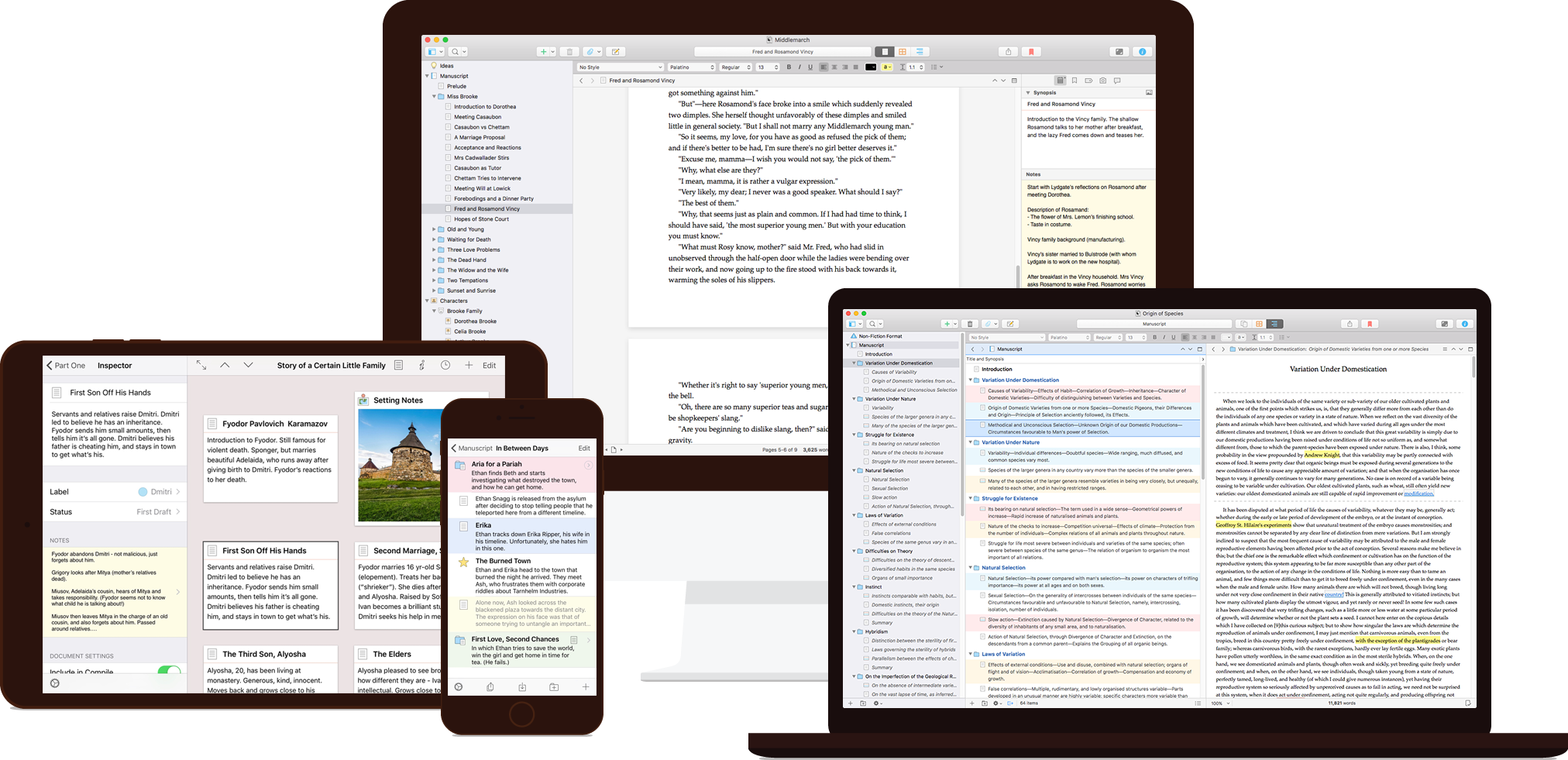This page is constantly updated with helpful resources for all kinds of writing. Whether you are looking for books, podcasts, youtube channels, or published books on writing advices; you can find it here.
Got a resource you want to share with other writers? Head over to the contact page and send it my way! Every resource is reviewed before being added here!
Tools
Scrivener

There are many tools out there for writing. Many writers may choose to write in tools that they learned in, like Microsoft Word. Or they might make a lateral move to a similar product like Google Docs. These word editors are truly top of the class and their years of use mean that there is a large community surrounding the development of these tools.
Scrivener is a tool that has that same community, that same classic text editor, and a HUGE amount of tools specifically designed for the storyteller.
With Scrivener, you can plan your writing using outlines and corkboards and timelines. You can create detailed portfolios for each character and location. It provides the freedom to manipulate the project fitting your needs.
A community of creators have created useful and detailed project templates to help you get on your way. These templates can include plot frameworks, character worksheets, and insightful comments to help your writing.
Scrivener does even more that help you plan and write your novel. It helps you edit, revise, and finally export your novel into whatever format you need.
Whether you’re writing a screenplay, a novel, or a paper; Scrivener is a complete writing project manager. I cannot imagine writing my stories without it.
The last, MAJOR thing to note is this: Scrivener is a one time fee (and reasonable at that). In a world of subscriptions, recurring payments, and cloud-based tools; Scrivener breaks the mold to create a lifetime product.
Try Scrivener for free here
ProWritingAid
After you write your story comes the dreaded editing. This can be a grueling process of killing darlings, changing individual words, or scrapping entire chapters. *Anything that you can do to make this process easier pays dividends.
There are plenty of tools to help editing. You’ve been using these tools for decades. Spellchecker helps you catch simple writing mistakes and those pesky grammar mistakes. ProWritingAid is like spellchecker on steroids.
In 2020, I purchased a lifetime subscription to ProWritingAid for a couple reasons:
- While it’s a great tool for editing your stories, it also integrates seamlessly with so many other tools
- An industry-standard spelling and grammar tool is useful in all kinds of writing: Social media, business emails, fiction, you name it.
- It is the only native integration with Scrivener, allowing you to easily edit entire chapters without opening any more windows/programs than necessary
I stand behind ProWritingAid and highly recommend you sign up for the free trial here.
Podcasts
Fiction Writing Made Easy with Savannah Gilbo
There are many writing podcasts out there, but this one may be one of the most useful. You’ll like this podcast because the host, Savannah Gilbo purposefully frames her content with actionable takeaways. In a lot of cases, discussion surrounding storytelling results in abstract advice like “ask your characters questions” or, more vaguely, “fill out a character sheet to understand your characters.”
As a technical writer, I like that Savannah caps off each episode with takeaways that can be directly applied to your own writing. Some episodes include interviews with her students, many of who have just hit writing milestones (getting an agent or finishing a final draft) and include lessons they learned along the way. Other episodes may be breakdowns of first chapters of different books (like each Harry Potter book) and the theory behind the decisions the author made in that first chapter.
As a technical writer, I like that Savannah caps off each episode with takeaways that can be directly applied to your own writing.
Savannah Gilbo is a shining star in the writing community. She is a writing coach and offers the exquisite Notes to Novel course. Any writer serious about improving their craft should tune in to Savannah’s podcast.
The Fantasy Writers’ Toolshed by Richie Billing
This podcast is more targeted to writing fantasy, but writing tips are writing tips! While some episodes are pretty rooted in fantasy, other episodes include interviews with established fantasy writers. Richie Billing begins many of these interviews with a discussion of the author’s writing process. Do they write in a cafe? Home office? Cooped up in bed (not as uncommon as you think)?
These episodes can vary in length, but I tend to find many episodes more bite-sized than Fiction Writing Made Easy. If you are a fantasy or sci-fi writer, this podcast is a goldmine of worldbuilding, magic systems, and the minutiae of fantasy.
I found the interview with Adrian Tchaikovsky to be especially good, but maybe that’s because I’m a big fan of his books!
Six Figure Authors
This podcast, hosted by a group of experienced self-published authors, is jam-packed with advice for authors who want to dive into the world of selfpub. There are many benefits to choosing to self-publish instead of traditional publishing, but also much more responsibility. Check out the episode above for the pros and cons for each publishing method!
Six Figure Authors is hosted by Lindsay Buroker, Joseph R Lallo, and Andrea Pearson. These authors combine for over 80 books published. They discuss the merits of building a backlog, how to advertise and market your books, when and where to run sales, and their advice on writing.
These episodes are pretty meaty, running close to an hour on average for each episode.
The podcast runs for nearly 130 episodes, but has no more plans for consistent, weekly episodes as the authors move to new chapters of their own lives.
The podcast runs for nearly 130 episodes, but has no more plans for consistent, weekly episodes as the authors move to new chapters of their own lives. Any additional episodes may be considered one-off updates on each authors life and work. That being said, the 130 episodes in the current cataloge contain timeless information and advice.
Books
On Writing: A Memoir of the Craft by Stephen King

The daddy of writing advice from the master of the craft himself.
The first half of this book is a memoir of Stephen King where he talks about his history with writing, being a teacher, and trashing his first novel. It follows from those early days of his first stories to joining a band of other authors to play music at bars.
The second half of his book is the ultimate book on writing advice.
Is this book a must-read for aspiring authors? Absolutely. Stephen King is the most successful writer of the modern era with nearly half a century of publishing experience and more adaptations than any other single writer in history.
While this book does have plenty of writing advice, the most valuable outcome of this book is the inspiration to write that every reader feels. This book will single-handedly send every aspiring writer on a multi-week journey of feverish writing. I repeatedly come back to this book to feel that inspiration that King is able to inspire.
Pick up the book from Amazon here!
How to Write Science Fiction and Fantasy by Orson Scott Card

Orson Scott Card, of Ender’s Game fame, has written a concise classic on how to create great characters and worlds. It’s a small book. It won’t take much room on your shelf, yet the impact it leaves betrays the size of the small book. The best part is, if you like this book, this series of writing reference books covers a couple different topics from multiple accomplished authors!
Websites
Looking for helpful websites for becoming a better writer? Congratulations! You’re on the exact same journey that lead me to making this website. So many websites just seemed to miss the mark for writing advice. Take advantage of all the great content we have here, but don’t stop searching for the best writing advice across the internet.
Writer’s Digest
One of the oldest, and most popular, resources for writers. Writer’s Digest provides a huge archive of accessible knowledge from the publishing industry to writing advice from writers themselves. This may be the best resource to get advice from industry professionals. If you’re a sucker for content in print, it’s relatively cheap for a subscription to Writer’s Digest!
A possible downside to the platform, and likely any platform as big as Writer’s Digest, is that much of the content may be influenced by marketing. You see an article that you’re interested in? How wild, the author of the post also happens to be publishing a book on that subject this week. It doesn’t negate the content of the article, but it can sometimes feel a little disingenuous or poorly thought out because this writing advice is really a marketing post in disguise.
The Writing Subreddit used to be my home for writing advice until I realized how truly empty it was. Every now and then, the community did create some truly great content. Yet, 99% of the posts in the subreddit revolved around very surface-level questions and advice.
“Am I bad for not liking my first draft?” “How do you name your characters?” “Is it better to a plotter or a pantser?”
Every single day. Same posts, same questions, same depth.
However, the great thing about Reddit is that there are always other communities to explore. Here are some great communities of writers:
- Destructive Readers - A community about sharing writing and receiving constructive criticism. A great place to go if you truly want valuable feedback on your writing. If you do not take constructive criticism well, avoid this community!
- World Building - A community for sharing created worlds, tips and ideas on settings and magic systems, and fun exercises!
- PubTips
- Writers
- NaNoWriMo - Especially in November, it pays to be part of this group. Everyone shares their lessons learned, stories written, and experiences surrounding the flurry of writing within National Novel Writing Month.
